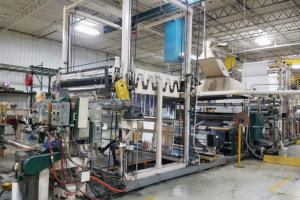Why Business Owners Needs Coating Converting Services

What Does Converting Mean in Manufacturing?
The term converting doesn’t only apply to coating converting services. In fact, it’s more of a general term, covering a variety of practices. When a supplier provides a material and modifies that material in some way, they’re converting the material. Imagine a large sheet of metal provided to a client, too large for their purposes. If that client had the sheet cut in half, this would qualify as conversion. Conversely, when we coat product previously without coating, that product has always been converted.
What is the Converting Industry?
In manufacturing, converting can cover a wide variety of different practices. Some of the industries connected to the converting industry include the automotive and medical device industries. Communications components may also require converting. Conversion is such a broad process that there are naturally many companies in need of it—which means that there, in turn, is a thriving converting industry.
The converting industry serves these other industries. When a company needs a product modified in some way, they frequently decline to do so “in house”. Rather, they outsource their conversion needs, seeking companies that handle conversion for others. In cases like these, a third party company handles coating converting services —a specialist, in a sense.
What Does A Converting Company Do?
Those specialists cover a wide variety of services. There are a few different types of main converting services. They include:
- Slitting: This process begins with a large roll of material. That roll is changing through the process of slitting or spooling. Slitting involves narrowing these larger rolls into smaller ones through cutting. The large roll is the master roll. Typically, master rolls are meant to be as large as possible in order to save money during the initial manufacturing process.
- Spooling: When spooling, manufactures take together cut pieces of material, and put them together in one large roll. Usually, we execute this through winding material around one large core, and ultimately results in material that is easier to use.
- Die cutting: Die cutting relies on creating shapes out of a raw material. We create these shapes in a variety of different ways, usually cut or punched out of the initial raw material. Common forms of die cutting include flatbed, clam-shell, and rotary die cutting.
- Laser cutting: This converting process is most frequently preferred for short runs and prototypes. It’s used to create easy, precise cuts on a variety of different materials.
- Coating: Clearly, coating is a type of converting process that changes the exterior of a material. Coating involves applying a layer of product atop a different material. At times, this makes the surface stickier through adhesive coating. Coating serves many different purposes, and quite frequently business owners turn to third-party resources for coating converting services.
What Are The Benefits of Outsourcing Coating Converting Services?
Whether you’re working with coating converting services or other types of converting services, there is a wide variety of reasons why business owners choose to outsource converting. The great thing about the converting industry is that there are options available for business owners, regardless of the type of converting they require.
Some of the main reasons why business owners choose to outsource converting include:
- Reduced cost: When converting products in house, you’re investing in not only the equipment and facilities, but temporary or permanent employees. Typically, it’s much more affordable to simply have your converting processes outsourced to experienced companies that have everything required on hand already.
- Higher quality: Even if you have the best of intentions, converting products in house can result in lower quality orders. When you don’t know what you’re doing, it’s sometimes quite difficult to execute an order properly. A professional converting company not only has the expertise necessary to deliver high quality products, but the resources required. Experienced converting companies can source experienced employees and higher quality raw materials.
- Flexibility: A good converting company has the ability to create finished products as well as prototypes. This isn’t always possible when you’re working with limited resources in your company. Taking a product from its prototype stage to the final product without having to switch facilities is quite useful and maintains consistency.
- Increased productivity: When you outsource converting to other companies, you and your employees focus on other tasks. Ultimately, this results in a more productive manufacturing experience.
Partner with an Experienced Team
As you can see, coating—and converting in general—is a bit more complicated than it seems on the surface. This doesn’t mean it’s impossible to ensure that a product that requires coating is properly finished. However, it does require the assistance of an experienced company that has both the resources and the employees necessary to deliver a good product. We invite you to connect with CTI directly here or call 419-924-5566. Consultations are easy, and you’ll not only learn about what CTI can do for you, but the intricacies of converting processes. It’s important to know, with manufacturing, the workings of these processes.
- << < Previous Post
- 1
- 2
- ...
- 63
- ...
- 250
- 251 Next Post > >>
